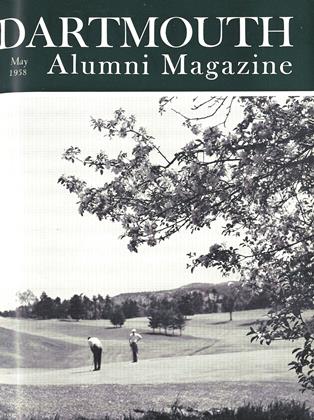Dartmouth next fall launchesa new academic Departmentand a new four-year major in
ANEW academic department, the Department of Engineering Science, has been added to the Science Division of the College and will begin operation next fall with the introduction of the three-term, three-course program.
As approved by the Dartmouth Board of Trustees at its meeting in Hanover last month, the Department of Engineering Science will be manned by members of the faculty of the Thayer School of Engineering, under the chairmanship of Dean William P. Kimball '2B. In cooperation with the Departments of Mathematics, Physics and Chemistry, it will offer a new four-year major in engineering science, beyond which the student may go on to a fifth year at Thayer School; and it will be the means of carrying out a new program designed to integrate engineering studies with the basic physical sciences, in fine with the demands of new and developing technologies. The Dartmouth tradition of a strong grounding in the liberal arts for all engineering students will be maintained in the new program, which calls for the student's taking as much as forty per cent of his college work in the humanities and social sciences.
sci-Creation of the Department of Engineering Science, with Thayer School faculty members teaching in the undergraduate college as well, marks a new degree of coordination between the College and one of its associated schools. The new major, blending engineering studies with the basic sciences, humanities and social sciences, will provide a common core of academic work for all men pursuing engineering studies, regardless of the direction or extent to which they carry them.
At the end of the four-year program the student may terminate his course of study and graduate with the A.B. degree, as with any other major in the undergraduate college. Qualified men who want to acquire a professional engineering degree will take a fifth year at Thayer School, leading to the Bachelor of Science degree in civil, electrical or mechanical engineering. Another fifth-year alternative leading to the B.S. degree is the combined course in engineering and business administration, offered jointly by the Thayer and Tuck Schools. Two additional prescribed courses in senior year will prepare these men for their graduate, professional studies.
A further option for graduate work, which is new under the revised program, is a fifth year in engineering science. Restricted to the ablest students, this fifth-year curriculum will offer graduate courses in mathematics, physics and engineering theory and will require a Master's degree thesis. It will lead to the undesignated Master of Science degree.
DARTMOUTH'S new program of engineering education has been several years in the making. In July 1954 the Trustees Planning Committee directed that a study be undertaken to determine the future nature of the engineering program at the College. A committee of three outside consultants accepted the invitation to make such a study. It consisted of Dr. Gordon S. Brown, head of electrical engineering at the Massachusetts Institute of Technology; Dean S.C. Hollister of the Cornell Engineering School; and Dr. John A. Hutcheson, vice president of the Westinghouse Electric Corporation.
In April 1955 these consultants submit ted a report to President Dickey, and in it stated: "Dartmouth... has a golden opportunity to do two things at once. The first is to train well-rounded men, and the second is to give them a training in the physical sciences that will qualify them for the kind of engineering competence that will have the greatest social value in the future with the maximum potential for creative leadership. Very few schools now do this."
Throughout the 1955-56 academic year, a Dartmouth faculty committee from the Mathematics, Physics and Chemistry Departments and from the Thayer School, under the chairmanship of Prof. Donald H. Morrison, Provost of the College, studied the recommendations of the consultants and developed a program of engineering education incorporating most of the proposals of the consultants and carrying out the general intent of their report. The faculty committee's report was approved by the faculty and the Board of Overseers of Thayer School, and in June 1956 was accepted by the Dartmouth Board of Trustees as the basis for the future program of engineering education at the College.
A laboratory session (1) under Professor Reynolds relates structure to properties, and (r) students test the compressibility of soils.
A laboratory session (1) under Professor Reynolds relates structure to properties, and (r) students test the compressibility of soils.
 View Full Issue
View Full Issue
More From This Issue
-
 Feature
FeatureThree Civil War Letters
May 1958 By WILLIAM D. HARTLEY '58 -
 Feature
FeatureChronicler of Gettysburg
May 1958 By EDWARD CONNERY LATHEM '51 -
 Class Notes
Class Notes1923
May 1958 By CHESTER T. BIXBY, THEODORE D. SHAPLEIGH -
 Class Notes
Class Notes1918
May 1958 By ERNEST H. EARLEY, RICHARD A. HOLTON -
 Article
ArticleWhat Is "New" in the Program?
May 1958 By WILLIAM P. KIMBALL '28 -
 Class Notes
Class Notes1911
May 1958 By NATHANIEL G. BURLEIGH, JOSHUA B. CLARK
Features
-
 Feature
FeatureDartmouth's Night
OCTOBER 1996 -
 FEATURES
FEATURESDream Team
SEPTEMBER | OCTOBER 2022 -
 Cover Story
Cover StoryTrapped in the Bwindi Impenetrable Forest
MAY 1999 By ALIETTE FRANK '00 -
 Feature
FeatureTHE 5 MINUTE GUIDE TO THE COLLEGE GUIDES
Nov/Dec 2000 By JON DOUGLAS '92 & CASEY NOGA 'OO -
 Cover Story
Cover StoryAs We See It
JUNE 1999 By Julian Okwu '87 -
 Feature
FeatureMt. Washington Pathfinder
January 1956 By ROBERT S. MONAHAN '29


